Hype in the Drink Aisle
For decades, the primary drinks sold in supermarkets were soda or juices. Billion-dollar companies like Coca Cola and Pepsi battled it out for your grocery dollars. Then the market started to break up.
Sports drinks became a whole new category with the introduction of Gatorade in the 1960s. Bottled water became a popular new fixture in the 1970s and diet drink options exploded in the 1980s.
With so many choices in the bottled drink aisle, companies had to get creative to breakthrough. Drinks began to be heavily promoted for the "healthy" things they did, even when those claims weren't true.
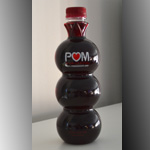 POM Wonderful is an example. Bottles of pomegranate juice were marketed with statements like this. "“SUPER HEALTH POWERS! … 100% PURE POMEGRANATE JUICE. … Backed by $25 million in medical research. Proven to fight for cardiovascular, prostate and erectile health.”
POM Wonderful is an example. Bottles of pomegranate juice were marketed with statements like this. "“SUPER HEALTH POWERS! … 100% PURE POMEGRANATE JUICE. … Backed by $25 million in medical research. Proven to fight for cardiovascular, prostate and erectile health.”
It wasn't true of course, but the power of advertising is strong. POM Wonderful became a hit and sales started growing dramatically. That is, until the Federal Trade Commission (the FTC) stepped in and made them stop telling lies.
In 2010 the FTC settled their deceptive advertising charges and let the world know that the makers of POM Wonderful, "...made false and unsubstantiated claims that POM Wonderful 100% Pomegranate Juice and POMx supplements prevent or treat heart disease and prostate cancer."
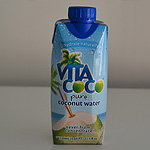 When one company stumbles, there are always others willing to step in. Vita Coco coconut water claimed that its products were "super-water," "super-hydrating," "nutrient-packed," and "mega-electrolyte." They were sued in a 10 million dollar class-action lawsuit, and agreed to settle when all those statements were found to be misleading.
When one company stumbles, there are always others willing to step in. Vita Coco coconut water claimed that its products were "super-water," "super-hydrating," "nutrient-packed," and "mega-electrolyte." They were sued in a 10 million dollar class-action lawsuit, and agreed to settle when all those statements were found to be misleading.
Kellie Lerner, attorney for the plaintiffs said, "For the millions of consumers who pay for products that claim to improve their health, this settlement sends a message that companies will be held accountable when they exaggerate or misstate the health benefits of their products."
If only that were true. Walk down the beverage aisle today and there are numerous examples of products that make false claims or hint at non-existent benefits. Here are a few examples.
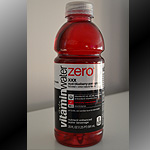 Vitamin Water is a privately owned subsidiary of the Coca Cola company. Right on the front of the label it proudly boasts about the ingredients inside like acai, blueberry and pomegranate. It has a healthy glow of superfruits without making specific claims. They also list the added b vitamins and antioxidants that have been put in each bottle.
Vitamin Water is a privately owned subsidiary of the Coca Cola company. Right on the front of the label it proudly boasts about the ingredients inside like acai, blueberry and pomegranate. It has a healthy glow of superfruits without making specific claims. They also list the added b vitamins and antioxidants that have been put in each bottle.
Don't look too closely at the ingredient label. If you did, you would find that "less than 1%" of the ingredients are the fruits prominently listed on the front. That's like eating a single blueberry!
The added antioxidants are even more worrisome. When researchers looked at 68 randomized trials with 232,606 participants, they found was that people who took the antioxidant supplements, beta carotene, vitamin A, and vitamin E; experienced greater mortality than people who took a placebo.
That's right, people who took antioxidant supplements died sooner than people who didn't. That little bottle of Vitamin Water is just WATER, with unhealthy vitamins and the suggestion of fruit waved over it.
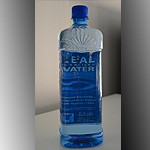 RE2AL Alkalized Water is a product that's trying to win over people who believe "that an acidic body can be unhealthy." So they made their product "alkalized and negative ionized" to "help your body become more alkaline to improve your health."
RE2AL Alkalized Water is a product that's trying to win over people who believe "that an acidic body can be unhealthy." So they made their product "alkalized and negative ionized" to "help your body become more alkaline to improve your health."
Of course, it's complete rubbish. Your stomach is so highly acidic, no water drink can change its acidity. You have something called enzymes that start all the chemical reactions in your body. Enzymes function within a narrow range of acidity. Should that acidity level fluctuate, your body quickly moves to change it back to normal. If it didn't, those chemical reactions that are critical to our survival wouldn't happen.
Drinking "alkalized and negative ionized" water isn't going to make one bit of difference in your health. It's just going to cost you hundreds of times more for that sip of water than the same amount from the tap.
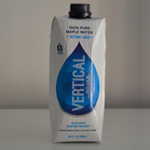 Maple Water from Canada is one of the newest "health drink" products. They're claiming to be packed with electrolytes and potassium but with only half the sugar of coconut water. Knowing that Americans are gullible enough to buy almost anything, I fully expect this product to be a success.
Maple Water from Canada is one of the newest "health drink" products. They're claiming to be packed with electrolytes and potassium but with only half the sugar of coconut water. Knowing that Americans are gullible enough to buy almost anything, I fully expect this product to be a success.
Who doesn't like maple syrup? Combining that with water and implying it's a healthy drink is brilliant. But like all the other health drink products, eventually people will see it for what it is. Overhyped water with sugary syrup mixed in.
UPDATE:
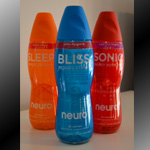 While researching this article, I ran across a new set of drinks from a company called Neuro. They included DAILY to "power up your immunity", BLISS to "help reduce stress, enhance mood and provide focused concentration", SONIC for "energy" and SLEEP "the first scientifically-based functional drink that gives you the full night's rest you need the natural way."
While researching this article, I ran across a new set of drinks from a company called Neuro. They included DAILY to "power up your immunity", BLISS to "help reduce stress, enhance mood and provide focused concentration", SONIC for "energy" and SLEEP "the first scientifically-based functional drink that gives you the full night's rest you need the natural way."
These drinks aren't hinting around that they'll help you, they're saying it right in their name. That's a clever move. You see in most cases, the name of a product isn't something that's regulated. So if you want to convince people your product will help them sleep, without any clinical proof, simply make SLEEP part of the name.
When people get mad that your product doesn't help them sleep, your defense is easy. You can say it's just part of the name, not a health claim you're making. After all, you don't think Dr. Pepper is a real doctor, right?
To see what research Neuro has done to back up their claims, I clicked on the link of their website that was titled, "The Science." It was nothing more than a page showing the four bottles and three marketing paragraphs that claimed, "...people tell us how well they work!"
No science. No proof. Just empty marketing trying to convince you to spend money on expensive flavored waters. Don't fall for it.
Call for a FREE Consultation (305) 296-3434
CAUTION: Check with your doctor before
beginning any diet or exercise program.
3/8/2015


